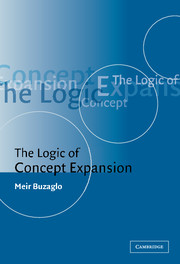Book contents
- Frontmatter
- Contents
- Preface
- Acknowledgments
- Introduction
- 1 Historical background
- 2 Frege's opposition
- 3 The grammar of constraints
- 4 Expansions as rational procedures
- 5 Implications for concepts
- 6 From words to objects
- 7 Gödel's argument
- 8 Implications for thoughts
- 9 “I was led astray by language”
- Epilogue: How do we go on from here?
- References
- Index
1 - Historical background
Published online by Cambridge University Press: 22 September 2009
- Frontmatter
- Contents
- Preface
- Acknowledgments
- Introduction
- 1 Historical background
- 2 Frege's opposition
- 3 The grammar of constraints
- 4 Expansions as rational procedures
- 5 Implications for concepts
- 6 From words to objects
- 7 Gödel's argument
- 8 Implications for thoughts
- 9 “I was led astray by language”
- Epilogue: How do we go on from here?
- References
- Index
Summary
The history of mathematics and the sciences is replete with examples of the expansion of concepts. Nowadays we are witness to a growing interest in the history of mathematics which has given rise to a range of essays on the history of specific concepts and theories. In this chapter, I should like to concentrate on several turning points and dilemmas in the development of the idea of expanding concepts and domains. This will require tracing the emergence of expansions as a general process from specific examples, and distinguishing these developments from the history of other general and basic notions such as algebraic structures and deduction. At the end of this chapter I briefly survey the state of the art in the study of expansions in mathematical logic and philosophy.
EARLY DEBATES
Expansions of concepts began to occur in seventh-century India, with negative numbers, the irrational numbers, and the zero. In sixteenth-century Europe a great number of expansions occurred one after another, giving Western mathematics a unique status. The first signs of this phenomenon were apparently the introduction of the zero and the beginnings of algebra, which were brought to the West by the Arabs.
When Western mathematicians developed these ideas, they did not follow pure logic; in fact, they had to make some compromises on rigor. If they had not done so, their expansions would have been blocked by the ancient Greek conception of mathematics, just as this conception had first blocked the acceptance of the rational numbers and then of the irrational numbers.
- Type
- Chapter
- Information
- The Logic of Concept Expansion , pp. 9 - 23Publisher: Cambridge University PressPrint publication year: 2001



